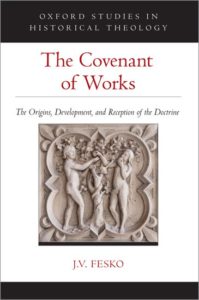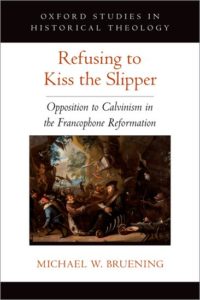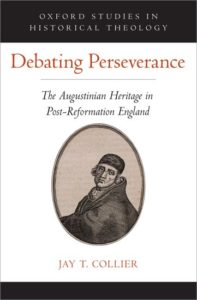
Author’s Corner: Oxford Studies in Historical Theology
Each week on Credo we welcome you to join us in the Author’s Corner where we will meet a set of authors whose recent books deserve your attention and might even help you grow in your knowledge of theology, history, philosophy, and the scriptures. We hope the Author’s Corner can keep you up-to-date on the most important books published today and where you can find them.
On today’s Author’s Corner, we present you with a selection from the Oxford Studies in Historical Theology, edited by Richard A. Muller (Oxford University Press).
Oxford University Press established in 1994 a new series of original monographs devoted to the history of Christian thought from its early and medieval beginnings to its later development in the modern period. The underlying assumption held from the first was that Christian ideas from the past can best be understood when scholars present them in their proper historical and cultural context. For 20 years the distinguished authors in this series have treated a wide variety of intellectual problems from the Christian past and, by so doing, have redefined the discipline of historical theology for the foreseeable future.
T he Covenant of Works: The Origins, Development, and Reception of the Doctrine (OUP, 2020) by J. V. Fesko
he Covenant of Works: The Origins, Development, and Reception of the Doctrine (OUP, 2020) by J. V. Fesko
The doctrine of “the covenant of works” arose to prominence in the late sixteenth century and quickly became a regular feature in Reformed thought. Theologians believed that when God first created man he made a covenant with him: all Adam had to do was obey God’s command to not eat from the tree of knowledge and obey God’s command to be fruitful, multiply, and subdue the earth. The reward for Adam’s obedience was profound: eternal life for him and his offspring. The consequences of his disobedience were dire: God would visit death upon Adam and his descendants. In the covenant of works, Adam was not merely an individual but served as a public person, the federal head of the human race.
The Covenant of Works explores the origins of the doctrine of God’s covenant with Adam and traces it back to the inter-testamental period, through the patristic and middle ages, and to the Reformation. The doctrine has an ancient pedigree and was not solely advocated by Reformed theologians. The book traces the doctrine’s development in the seventeenth century and its reception in the eighteenth, nineteenth, and twentieth centuries. Fesko explores the reasons why the doctrine came to be rejected by some, even in the Reformed tradition, arguing that interpretive methods influenced by Enlightenment thought caused theologians to question the doctrine’s scriptural legitimacy.
R efusing to Kiss the Slipper: Opposition to Calvinism in the Francophone Reformation (OUP, 2021) by Michael W. Bruening
efusing to Kiss the Slipper: Opposition to Calvinism in the Francophone Reformation (OUP, 2021) by Michael W. Bruening
History has long viewed French Protestants as Calvinists. Refusing to Kiss the Slipper re-examines the Reformation in francophone Europe, presenting for the first time the perspective of John Calvin’s evangelical enemies and revealing that the French Reformation was more complex and colorful than previously recognized. Michael Bruening brings together a cast of Calvin’s opponents from various French-speaking territories to show that opposition to Calvinism was stronger and better organized than has been recognized. He examines individual opponents, such as Pierre Caroli, Jerome Bolsec, Sebastian Castellio, Charles Du Moulin, and Jean Morély, but more importantly, he explores the anti-Calvinist networks that developed around such individuals.
Each group had its own origins and agenda, but all agreed that Calvin’s claim to absolute religious authority too closely echoed the religious sovereignty of the pope. These oft-neglected opponents refused to offer such obeisance-to kiss the papal slipper-arguing instead for open discussion of controversial doctrines. They believed Calvin’s self-appointed leadership undermined the bedrock principle of the Reformation that the faithful be allowed to challenge religious authorities. This book shows that the challenge posed by these groups shaped the way the Calvinists themselves developed their reform strategies. Bruening’s work demonstrates that the breadth and strength of the anti-Calvinist networks requires us to abandon the traditional assumption that Huguenots and other francophone Protestants were universally Calvinist.
D ebating Perseverance: The Augustinian Heritage in Post-Reformation England (OUP, 2018) by Jay T. Collier
ebating Perseverance: The Augustinian Heritage in Post-Reformation England (OUP, 2018) by Jay T. Collier
The Church of England during the late sixteenth and early seventeenth centuries is usually described as forming either a Calvinist consensus or an Anglican middle way steeped in an ancient catholicity. Debating Perseverance sheds light on the influence of both the early church and the Reformed churches on the church by surveying debates on the perseverance of the saints in which readings of Augustine were involved. It begins with a reassessment of the Lambeth Articles (1595) and the heated Cambridge debates in which they were forged, demonstrating that perseverance played a critical role. It then investigates the failed attempt of the British delegation to the Synod of Dort to achieve solidarity with the international Reformed community on perseverance in a way that was also respectful of minority opinions. The study returns to English soil to evaluate the supposedly Arminian Richard Montagu and the turmoil he caused by challenging the Reformed consensus and the Synod of Dort. It finishes by surveying a Puritan debate that occurred following England’s civil war, when the pro-Dort party had triumphed. Jay T. Collier’s study uncovers competing readings of Augustine on perseverance within the Reformed tradition-one favoring the perseverance of the saints and the other denying it. Rather than emphasizing one source of England’s religious identity to the neglect of another, this study recognizes England’s struggles with perseverance as emblematic of its troubled pursuit of a Reformed and ancient catholicity.

